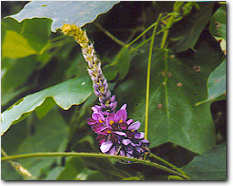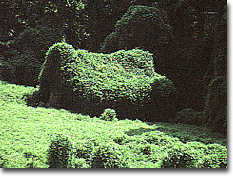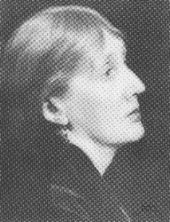
Jan '03 [Home]
Other Arts: Film

 Jan '03 [Home] Other Arts: Film 
She Nurtured the Flower that Devoured Him
|
| . | . | . | It is precisely the task of the writer to go beyond the formal railway line of And, she might have added, 'all at once.' Norwegian Knut Hamsun wrote the first modern novel, an inner narrative of resplendent mind and empty gut, Hunger (1890), which most literate teens devoured like the Werther of their era, young Woolf no doubt included. Thus, my initial curiosity about The Hours, its title borrowed from Woolf's original one for Mrs. Dalloway (1925), ran to how Hare's screenplay would treat interior monologue. I was hoping for better than Kundera's The Unbearable Lightness of Being (1984, 1988) received (or his Slowness will): Tomas intent at his window, but no effort made to convey the author's brilliant opening eternal recurrence theme. (Even Lyne let Nabokov narrate the closing scene of Lolita.) My companions at the showing, a virtual book club save one, were dismayed by such omissions. The unread one in the group, left cold by Tomas's surrender of his passport to the border guards of his country's doom, wept buckets at the death of the couple's gender-confused dog. Interior monologue, it turned out, plays no part at all in Hare's screen treatment of Cunningham's novel. Woolf plays the dog. All the vivid, pointless moments that can't be told as stories On a clear, contemporary morning in June, Clarissa, 52, walks from her West Village brownstone garden duplex to the florist, places her party order, and brings an armload to Richard, 53, her lover at eighteen, a poet-novelist now stricken with AIDS, whom she will feed at 5:00 among friends and generous roses, and then deliver to his award ceremony. When she returns to dress him at 3:30, he begs off. "I don't think two people could have been happier than we've been," he says, and gently slides off his fifth-floor tenement sill. He seems so certain, so serene, that she briefly imagines it hasn't happened at all. . . . The air itself seems to have changed, to have come slightly apart; as if the atmosphere were palpably made of substance and its opposite. She runs down the stairs and is aware (she will be ashamed of this later) of herself as a woman running down a set of stairs, uninjured, still alive. . . .All she can make sense of in the glistening mass of red, purple, and white are his parted lips and one open eye. . . . She feels (and is astonished at herself) slightly embarrassed by what has happened. She wonders why she doesn't weep. . . . Guiltily, as if she is doing something forbidden, she leans over and rests her forehead against his spine. . . . If she were able to speak she would say something—she can't tell what exactly—about how he has had the courage to create, and how, perhaps more important, he has had the courage to love singularly, over the decades, against all reason. She would talk to him about how she herself, Clarissa, loved him in return, loved him enormously, but left him on a street corner over thirty years ago (and, really, what else could she have done?). She would confess to her desire for a relatively ordinary life (neither more nor less than what most people desire), and to how much she wanted him to come to her party and exhibit his devotion in front of her guests. She would ask his forgiveness for shying away, on what would prove to be the day of his death, from kissing him on the lips, and for telling herself she did so only for the sake of his health. In the hours between, we meet the other human particulars of Clarissa's day-in-the-life as a book editor (not Richard's): Sally, her TV producer companion of eighteen years; Julia, her fatherless, teenaged daughter; and Louis, who won difficult Richard at the end of their summer as a threesome, but left him after several years 'for simpler passions.' Now a literature professor, Louis arrives unannounced from San Francisco as she is preparing the feast. Only he can return her to her moment of supreme happiness: the third who stood beside them on a high dune watching the waves. Clarissa wants, suddenly, to show her whole life to Louis. She wants to tumble it out onto the floor at Louis's feet, all the vivid, pointless moments that can't be told as stories. She wants to sit with Louis and sift through it. . . . Clarissa touches Louis's shoulder, and it seems that they will both rise, without speaking, go upstairs to the bedroom and undress together. He is in love with one of his students. He sobs. As she rubs Louis's back, Clarissa thinks, Take me with you. I want a doomed love. I want streets at night, wind and rain, no one wondering where I am. . . . Neither of these scenes appears in the film. There, Richard evaporates tidily after his fall and, amid the kitchen preparations, it is Clarissa, not Louis, who breaks down, a woman fearful she may be 'trivial,' yet contending with 'too much, too much.' ("I feel like I'm unraveling. It's like a presentiment.") Dry-eyed Louis extends no hand to comfort her: Richard's novel devoted fifty pages to her not buying nail polish, a mere chapter to him. Part of people she has never met Los Angeles, 1951. Laura unwittingly evoked the iconic love of a war-time serviceman. She has married him out of patriotism, had his child, and is trying to live out his romance hour by hour. On the morning of his birthday, he buys her flowers. Fragile, and pregnant again, she overcomes the urge to rest in bed reading Mrs. Dalloway (a gift from him), gives him a suburban send-off, and dutifully bakes and decorates a cake under the guided supervision of her 'Bug.' Despite crumbs in the icing, she is momentarily fulfilled. A childless neighbor drops in and confides over coffee that she is on her way to uterine surgery. As Laura consoles her maternally, the two kiss. The neighbor is unfazed, the mother undone. She throws out the first and makes another, better, but still imperfect cake. She wants (she admits to herself) a dream of a cake manifested as an actual cake; a cake invested with an undeniable and profound sense of comfort, of bounty. She wants to have baked a cake that banishes sorrow, even if only for a little while. She wants to have produced something marvelous, something that would be marvelous even to those who do not love her. There is, indeed: she is cursed with the capacity for awe. Laura "reads the moment as it passes. Here it is, she thinks; there it goes. The page is about to turn." [208] Bug is consigned to a sitter while his mother drives to town and checks into a good hotel for two hours—with her book. She is so far away from her life. It was so easy. . . . [149] In the film, Laura on her hotel bed is suddenly overwhelmed by a loud, cresting English river. She lurches awake, retrieves her adoring, suspicious (but no slow-motion, yowling head case as the film depicts) little boy, and serves her family dinner and dessert. It would be as simple, she thinks, as checking into a hotel. It would be as simple as that. Unlike the depiction in the film, she is not a suicide just short an opportunity, but rather, an unacknowledged artist confused by her ability to abstract life from the living of it as they do not. It seems she has succeeded, suddenly, at the last minute, the way a painter might brush a final line of color onto a painting and save it from incoherence. . . . It has to do, somehow, with setting plates and forks on a white cloth. [207] However, when she does go away, it's simpler yet: she drives to Canada and outlives them all. Regrettably, neither novelist nor screenwriter allows her to stay away, loving her continuing-life-differently option, surviving (as a librarian), part of people she has never met: Clarissa, for instance, who, (like us) believing her long dead, must summon Laura for a same-day Fifth Act descent from Toronto as eighty-year-old muse, the putative explication de texte for her son Richard's writing and the pat Freudian source of his torment. At the desolate party table, she reproaches and explains herself—though not so much to Clarissa as to Dr. Benjamin Spock—while the viewer congratulates herself on the revisionist revealed wisdom that the sorrows of Fifties housewives were not ordinary ones: Yes, we have an idea, Laura, poor, pre-liberation Laura. Had the film contented itself with the image of Richard holding the black-and-white wedding picture with its aura of doomed promise and a tear, not of self-pity, but of Virginian empathy for a stranger descending down his emaciated cheek, viewers could have been free to devise our own slantwise correspondence, say, between the death of the crazed Septimus Smith and Mrs. Dalloway's anonymous compassion. Hell, we could have stroked in the novelist's empathy for Richard—Woolf's—a special effect of the mind which Cunningham invited with could-it-be? poetry and Hare ruined with oh-I-get-it! prose. Moreover, as Richard—who intuits the stop-living option without classic modernist fiction—describes his artistic vision in the novel (amended for film as "I wanted to show how everything is connected"), it is unclouded by maternal wrongdoing: "I was a nineteen-year-old and I was in love with Louis and I was in love with you, and I thought I had never seen anything so beautiful as the sight of you walking out a glass door in the early morning, still sleepy, in your underwear. Isn't it strange?" (And perhaps unexpected, that her Michael Fury has survived to middle age.) "I've failed." With that, he praises Woolf's ambition, and then succumbs to her 'old weed.'  " . . .I've felt it for some time now, closing around me like the jaws of a gigantic flower. . . .Think of kudzu choking a forest. It's a sort of juicy, green, thriving progress. Toward, well, you know. The green silence." Portrait of the Artist as an Young Mutt Leonard (Stephen Dillane), reduced to an incidental player in this conflation of Hannah and Her Sisters, Play It As It Lays, and All About My Mother, wears the frumpy cardigan sweater and milk sop furrows Hollywood must think fit the American stereotype of British writer-publishers. If Woolf is portrayed as a reclusive Aunt Loony with no mention made of her finger-cramping efforts to produce ill-paid reviews for her keep and his, neither does Leonard receive any credit for high intelligence and astute contributions to scholarship. Instead, he is set up as the timid, talentless foil to his wife's Zelda-zest for life (that train platform scene—yikes!), spectator to her strokes of tragic genius, and teeth-sucking orderly to her unruly patient. The one and only successful moment in A Beautiful Mind, another much ballyhooed Hollywood attempt and failure at high-minded film-making, comes early on. Pale blue light play reflects the mathematician's perception of geometric connection among random objects on a table; a single moment when the film arguably captured something of the workings of the intellect. Given the years elapsed, though, it was a not very remarkable technological improvement on Gregory Peck's dream geometry in Spellbound. Hollywood films are at a loss to portray writers writing. Woolf's conception of Mrs. Dalloway, whether working out whispered snatches on the human condition in the parlor before her snickering nephews or surrounded by discarded pages in her room with a view, plays like a college co-ed conceiving a novel of young romance by snagging plot and theme insights as they loft through the autobiographical quotidien. As though representations of authorial work habits were not ridiculous enough, the film offers them up as a quill-crunching how-to for other aspirants, as long as they can muster the requisite crankiness when anyone cracks the door to the sanctum with the offer of food or an exhortation to rest. A 'novel of ideas' means nothing to such would-be writers. Woolf continually reminded herself (and others), that whatever the ideas, one still had to "get one's people from lunch to dinner." At minimum, we could expect a sense of the writer's wee-hour drive to explain the day before thoughtless doers arise with platitudes of self-congratulation for simply greeting it early. Most importantly distasteful, however, is the lushly photographed exploitation of Woolf's opening- and closing-credit wade into the river to irrigate the other film with an emotional gravitas it arguably does not earn on its own merit, and to do so with little more than a hardcover propped like a product placement on Laura's swollen belly and a few slick cutaways. The worst of these among many is lemme-outta-here lamentable for the Buffy, the Vampire Slayer meets Dead Poets Society tone of the dead bird scene, which, while quite subtly depicted by Cunningham with its focus on the workings of Vanessa's daughter's mind, is rendered mawkish and vulgar as Kidman's recumbent face fills the screen (reminiscent of the poster for that dreadful sailboat thriller she was in), her prosthetic nose put to the lighting test and failing as it dwarfs even the heavy-handed symbology, rendering Woolf narcissistic and the moment just downright embarrassing. And yeah, it's, er, like a presentiment. For her. I guess.—Cut to Laura's recumbent face on her bed in the hotel. Brother. Two birds, with one millstone. Such treatment belies the skill brought to bear by Michael Cunningham in transitioning from the immediacy of one on-going life to the other. But for the too-facile Freudian choice, his book is a rewarding achievement. Daniel Day Lewis as Tennessee Williams Nicole Kidman recently appeared on Charlie Rose. It was the first time I had heard her converse without a script or observed her manner. ("Have you thought of directing?" "No. I'd rather be a… participator.") At 30-odd, the 6-foot tall high school drop-out is a wide-eyed, gigantic waif, with a sensibility woundable by a stiff breeze. Gwyneth Paltrow, for all her gushing in Oscar-pink satin, is a sturdy Rosalind to Kidman's flaky Ophelia. Evidently, this waifishness, combined with slightly off-plumb foreignness, is the key to her success, the aspect that wins her prominent roles from protective men. 
In her granny dress and clunky shoes as Woolf, Kidman comes off like a 16-year-old flower child. Her range is paltry. Woolf was writing Mrs. Dalloway at 42. Contrary to her portrayal in the film as suicidal, she had been free of the headaches for several years. ('I am alive; rather energetic. . . [T]he obstacle [poor health] is surely now a dead hand, which one should no longer let dominate our short years of life.' —July, 1923 (emphasis supplied).) Where Woolf was formidable, Kidman is no more than petulant. And the nose! She becomes cross-eyed and so do we, unable to see past it. Her speech, despite coaching, is not convincingly Bloomsbury, though it probably convinces most Americans. T.S. Eliot, who trembled before the real Virginia, would have withered this facsimile ("We'll make up whatever Woolf we want to."—Daldry to Kidman) with a single 'DA, DATTA.' [Photo by Man Ray, 1927.] A relatively low production value film, with clever art direction, simple sets, and primo roles for women, good actresses signed on. Julianne Moore as Laura creates a strange, Hopperesque stillness and opacity about her in this film, and her studied American accent, though sometimes odd and excessively flat, enhances the absence of reverberation in the air. Meryl Streep, as Clarissa, combines earthy, optimistic femininity with the promise of its exquisite collapse. Ed Harris, very gaunt as Richard, somehow converts his tough physical persona into an incarnation of artistic discipline. Jeff Daniels as Louis offers the right mix of plump, external smoothness and inner abrasion. Allison Janney as Sally never got to play her key scene from the novel, but was an asset all the same. Miranda Richardson is Vanessa Bell. 
In a perfect casting world, Woolf would have been played by an Englishwoman of the right age, with the right speech, and an aquiline nose. (Kristin Scott Thomas?) Just because Midwesterners would sit still for Russell Crowe as Mark Twain, doesn't mean that Southerners would tolerate Daniel Day Lewis as Tennessee Williams or that Londoners should have to put up with Kidman. But then, in a perfect screenwriting world, Harold Pinter, author of the unequalled Betrayal (1981), not David Hare, would have gotten the call, with the result that viewers would have had a truly adult film, structural innovations no obstacle. 
William Hurt and Raul Julia changed roles during rehearsal for Kiss of the Spiderwoman, to the delight of the actors, and the horror of the producers. Would that Meryl Streep, with much more to offer than just a suitably Virginian nose and a genius for accents, had switched into this role, Jessica Lange been persuaded to play Clarissa. And what of Kidman? Voice lessons for the Broadway revival of Annie, Get Your Gun. Hoo-hah! —MH[*] [NY Times composite ad offers all but the t-shirt. However, the original reviews of all Woolf's books are worthwhile.—mh] |